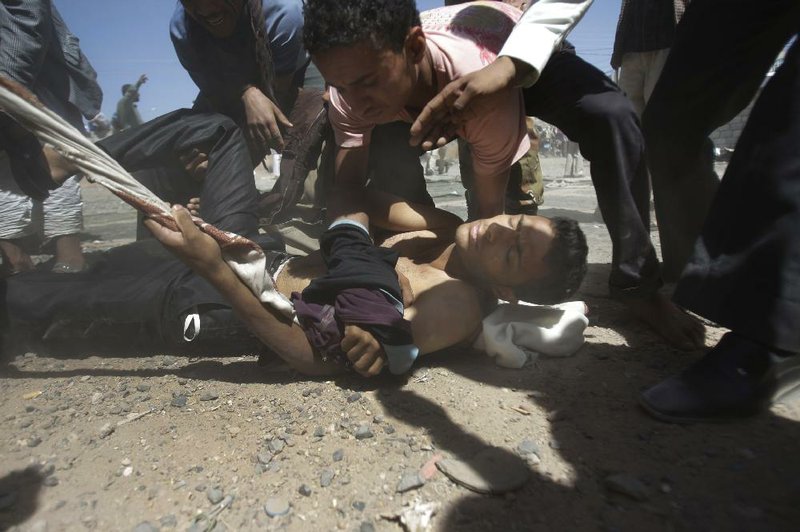SANA, Yemen — Yemen’s president called in the U.S. ambassador Tuesday and told him he would sign a deal to step down, a U.S. official said. President Ali Abdullah Saleh, who has made that pledge several times before, spoke as violence shook his capital.
Saleh informed Ambassador Gerald Feierstein of a new cease-fire, but clashes on the streets threw that into doubt. Activists said seven protesters were killed and 10 wounded.
It was the first meeting between Saleh and a U.S. ambassador since Saleh returned from Saudi Arabia last month, said U.S. State Department spokesman Victoria Nuland.
Saleh left Yemen after an attack on his compound in early June left him badly wounded.
Nine months of mass protests calling for his resignation have moved his powerful Arab neighbors, with U.S. backing, to propose a plan allowing Saleh to step down in exchange for immunity from prosecution.
That reflected a reversal for the U.S., which up to then had backed Saleh as an ally in its fight against al-Qaida in Yemen.
Nuland said Saleh confirmed he would sign the Gulf Cooperation Council plan for him to step down - a claim he has made several times this year but then backed down at the last minute, infuriating opponents and former allies.
She also said that Saleh confirmed that a cease-fire had been arranged with the opposition demonstrators, as announced on Yemen’s state news agency’s website.
In a statement on the website, Yemeni Vice President Abed Rabbo Mansour Hadi said a ceasefire agreement was reached with the aim to “lift checkpoints, barricades and open schools ... to return normal life to the capital.”
But late into Tuesday evening, troops were still firing into crowds of protesting civilians.
“It’s not clear that that has been completely enforced on either side since then, but we do consider it a good step,” Nuland told reporters. “There is still some fighting going on.”
The protesters marched through the streets surrounding Change Square, a central intersection where the uprising against Saleh started in February.
“The people want to prosecute the butcher,” the protesters chanted, and some held posters saying that after the death of Libya’s Moammar Gadhafi, it was time for Saleh to “listen to your people.”
Shooting broke out between Saleh’s forces and renegade troops loyal to Maj. Gen. Ali Mohsen al-Ahmar, who defected to the opposition and whose forces protect the protesters.
There were concerns that the intensified fighting could undermine U.S. and Saudi efforts to fight Yemen’s al-Qaida branch, considered by the U.S. to be the most dangerous of the terror network’s affiliates after it plotted two failed attacks on American soil in recent years.
Also Tuesday, a Yemeni military plane crashed before landing at the al-Ammad air base near the southern city of Aden.
Four people on board were killed and 11 injured, according to a security official who spoke on condition of anonymity because he was not authorized to talk to reporters.
The official said a technical problem might have caused the crash. He said eight Syrians and seven Yemenis were on board.
Meanwhile in Syria, a key opposition group called Tuesday for international monitors ahead of a visit to Damascus by senior Arab officials seeking ways to start talks and calm the 7-month-old uprising against the regime.
The broad-based opposition Syrian National Council said there can be no talks with President Bashar Assad’s government, particularly while it continues its military crackdown on protesters, which the U.N. says has already killed 3,000 people.
The group’s statement also called for a nationwide strike today.
Syria is becoming increasingly isolated with the U.S. on Monday pulling out its ambassador to Damascus, arguing that his support for anti-Assad activists put him in grave danger. Syria responded quickly Monday, ordering home its envoy from Washington.
Information for this article was contributed from Beirut by Zeina Karam of The Associated Press.
Front Section, Pages 2 on 10/26/2011
